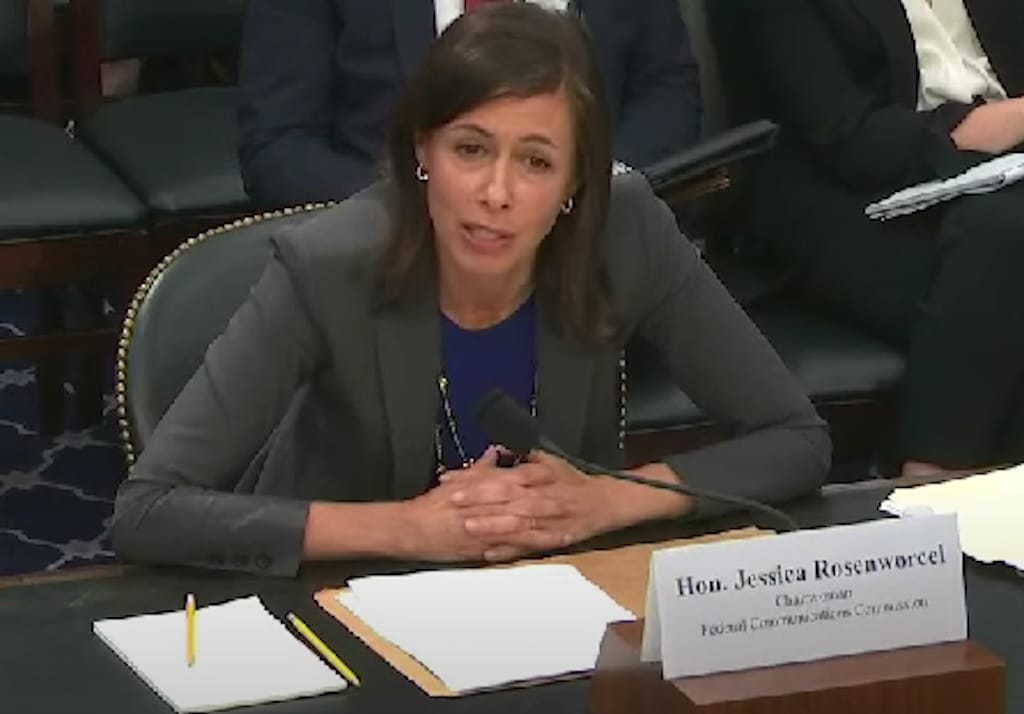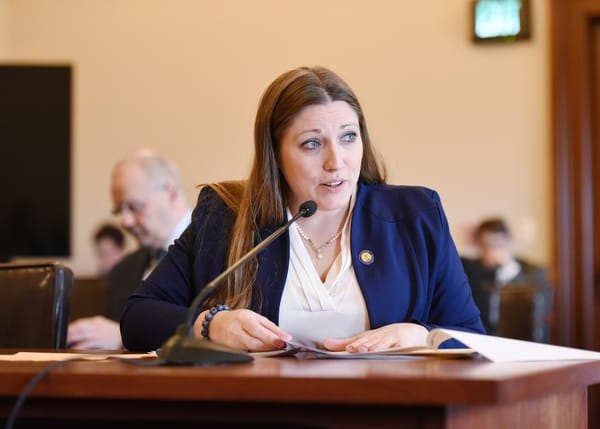No Funding for ACP, Rip-and-Replace in FCC’s FY25 Budget Request
Many budget priorities hinge on Congress reinstating the commission's spectrum auction authority.
Jericho Casper

WASHINGTON, May 17, 2024 – Federal Communications Commission representatives faced criticism from U.S. House members Thursday for failing to request funding for initiatives like the Affordable Connectivity Program and the "Rip-and-Replace" program in the commission’s fiscal year 2025 budget.
Testifying before the House Appropriations Subcommittee on the FCC’s fiscal year 2025 budget request, FCC Chairwoman Jessica Rosenworcel indicated that the commission assumes Congress will fully restore its general spectrum auction authority, suggesting this authority be used as a vehicle to fund initiatives.
The FCC's budget request exceeds $448 million, marking a 15 percent increase from the previous year's enacted level, and a much larger increase than historically requested.
Representative David Joyce, R-Ohio, criticized the agency for not including ACP funding in the budget. "This administration has spoken as if the continuation of the program is a top priority but relies on emergency spending measures that fall outside of our annual budget caps," he said.
Set to run out of funding this month, the ACP has provided discounts on broadband service and connected devices for eligible low-income households for the past two years.
Joyce also expressed surprise at the absence of funding for the Secure and Trusted Communications Network Reimbursement Program, known as the FCC’s "Rip-and-Replace" initiative.
The Rip-and-Replace initiative requires providers to remove certain Chinese-made equipment from U.S. communications networks. However, due to a shortfall of over $3 billion, roughly 122 providers lack the funds to replace the equipment and may require help to finance the projects.
"The budget proposal refers back to supplemental appropriation requests, which seem to be an attempt to rely on emergency spending rather than being clear about the overall budget,” Joyce said. “Instead of working proactively with Congress on a clear path forward to address the critical shortfall, the commission has relied on a prior supplemental funding request.”
Rosenworcel responded to inquiries about closing the funding gap, stating that reauthorizing the commission’s spectrum auction authority should be the vehicle for addressing this issue.
"There is conversation in the Senate about using revenues from upcoming FCC spectrum auctions to provide the necessary funding to ensure that the program can fully proceed," she said. "We need this authority back. For three decades, these auctions helped us distribute airwaves for wireless deployment and innovation. They also raised more than $233 billion for the United States Treasury."
The fee-based federal agency has not had the authority to auction off spectrum licenses since March 9, 2023.
Additional $30 Million for enhanced broadband mapping
A significant portion of the FCC’s funding request is for broadband mapping to comply with mandates set out in the Broadband DATA Act. This legislation required the commission to develop and maintain more accurate and detailed maps of broadband availability across the United States.
The commission’s budget request includes a $30 million increase to its base support. Rosenworcel said Thursday that the initial $98 million appropriation from Congress to cover the FCC’s development and implementation costs had been exhausted
“The reason you should continue this effort is: Congress just spent tens of billions of dollars on broadband deployment in the Bipartisan Infrastructure Law and other COVID-era legislation,” Rosenworcel said. “The only way to account for where that money is spent is by maintaining and updating this map.”
Under requirements, the FCC must collect granular broadband availability data from service providers, create and regularly update detailed broadband maps, and establish a verification and challenge process to ensure accuracy. The act also mandates public access to these maps and coordination between federal, state, and local governments, with map updates required at least every six months.
$6 Million more for spectrum auctions
The commission has requested $139 million to develop, implement, and maintain the spectrum auctions program, reflecting an increase of $6.7 million, or 5.1 percent, from the previous fiscal year.
According to the FY25 budget request, this funding will enable the FCC to implement several key initiatives, including preparing for potential auctions in the 3.1-3.45 GigaHertz band, and the auctioning off of 30 megahertz of identified spectrum in the 3.5 GHz band, as described in the Spectrum Pipeline Act of 2015.
Additionally, it will support the transition of the 3.45 GHz band and relocation of secondary users under the Consolidated Appropriations Act of 2021 and the 5G Act of 2020.
The funding will also continue activities under the RAY BAUM’S Act and MOBILE NOW Act to make spectrum available through auctions and transition it for mobile and fixed wireless broadband use.
Although the FCC currently lacks auction authority, the proposed Spectrum and National Security Act in the Senate aims to reinstate the authority until September 2029.
The bill would also allow the commission to borrow $5 billion from Treasury to support the Affordable Connectivity Program and an additional $3 billion to reimburse providers for replacing Chinese-made network equipment.
75 additional full-time employees
The FCC’s budget aims to increase the number of full-time employees at the commission by 75 over its current headcount.
“I want to point out that the FCC is operating during my tenure with the lowest level of employees we've had for 20 years. We are cut to the bone,” Rosenworcel said. “We need more folks to help us.”
To create a lean, accountable, and efficient FCC the commission requests 1,600 Full Time Equivalents, or FTEs, funded by a combination of salaries and expenses, the spectrum auctions program, and other budget authorities provided by the President and Congress, the FCC’s FY25 Budget-in-Brief explains.
Commissioners divided over budget and priorities
The hearing underscored the partisan divide within the FCC, with Chairwoman Rosenworcel and Commissioner Brendan Carr holding contrasting views on budget priorities and program funding.
“I do not support the FCC’s request for a 14.8 percent increase in its budget,” Carr said. “This increase marks a significant departure from agency precedent.”
“Second, I do not support expanding the FCC's headcount. Indeed if the FCC hired up to the 1600 FTEs it would represent the largest percentage increase in agency employees since the 1996 Act.
“Third, I don't support the FCC's requests for a 5.1 percent increase for our spectrum auctions program. The Biden administration has stalled out on spectrum auctions, and therefore I do not see a reason for increasing the FCC auction budget at this time,” Carr said.
The agency is currently split along party lines on many issues, including refunding the Affordable Connectivity Program and reclassifying broadband as a telecommunication service under Title II of the Communications Act.
Carr did agree that Congress should restore the FCC’s spectrum auction authority and fully fund the ‘Rip-and-Replace’ initiative.












Member discussion